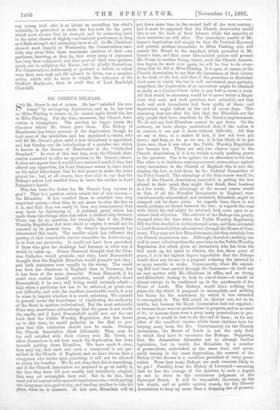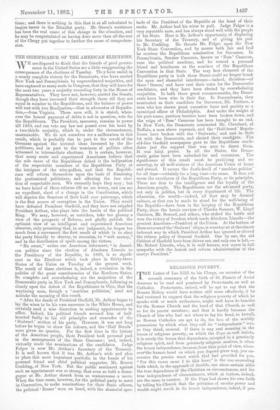MR. GREEN'S RELEASE.
SO Mr. Green is out of prison. He has "satisfied his con- tempt" by undergoing deprivation, and as he has now no Miles Platting to return to, he cannot again break the law at Miles Platting. For the time, moreover, the Church Asso- ciation is triumphant. The services no longer retain the character which Mr. Green gave them. The Bishop of Manchester has taken account of the deprivation, though he took none of the inhibition, and has appointed a curate, who will fill Mr. Green's place until a new incumbent is appointed, and last Sunday saw the introduction of a peculiar use, which is known in the diocese of Manchester as the "Cathedral Standard." In view of this last step, even the Church Asso- ciation consented to offer no opposition to Mr. Green's release. It does not appear that it would have mattered much if they had offered any opposition, for Lord Penzance seems to have made up his mind beforehand that he had power to make the order prayed for ; but, at all events, they were able to say that the Bishop's action had enabled them to leave the matter in Lord Penzance's hands.
Who has been the better for Mr. Green's long sojourn in gaol That is a question which admits but of one answer,— the Ritualists. It has enabled them to establish two very important points,—that they do not mean to obey the law as it is, and that they are ready to bear any consequences they may incur by disobeying it. A militant party which has made these two things clear has taken a distinct step forward. There can be no question, for example, that if the Public Worship Regulation Act were about to expire, it would not be renewed in its present form. Mr. Green's imprisonment has determined this much. The conflict which has followed the passing of that remarkable statute resembles the Kultarkanzpf, in at least one particular. It would not have been provoked, if those who gave the challenge had foreseen in what way it would be taken up. Prince Bismarck thought that the Prus- sian Catholics would grumble, and obey, Lord Beaconsfield thought that the English Ritualists would grumble and obey ; and both statesmen were equally in the wrong. The result has been less disastrous in England than in Germany, but it has been of the same character. Prince Bismarck, if he could ever confess himself mistaken, would admit—Lord Beaconsfield, if he were still living, would certainly admit— that when a particular law has to be enforced, at great cost and difficulty, and with the smallest conceivable result, it may be wiser to inquire whether it is worth enforcing. We concede in general terms the importance of vindicating the authority of the State in matters ecclesiastical. But the most autocratic State may sometimes acknowledge that the game is not worth the candle, and if Lord Beaconsfield could now see the one fruit that the Public Worship Regulation Act has borne up to this time, he would probably be the first to pro- pose that this confession should now be made. Perhaps the Church Association think differently. They may be too well satisfied with their victory over Mr. Green, to allow themselves to ask how much his deprivation has done towards putting down Ritualism. We have made it clear, they may say, that such and such a ceremonial is not per- mitted in the Church of England, and we have shown that a clergyman who insists upon practising it will not be allowed to retain his benefice. We do not deny that this is something, and if the Church Association are prepared to go on boldly in the line they have till now usually and tentatively adopted, they may yet accomplish their end. But to do this, they must not be content with sporadic imprisonments,—with putting one clergyman into gaol to-day, and sending another to take his place, when he is released. At this rate, Ritualism will be put down some time in the second half of the next century ; and it must be supposed that the Church Association would like to see the fruit of their labours while the majority of their members are still alive. The immediate results of Mr. Green's deprivation will simply be that Sir Percival Heywood will present another incumbent to Miles Platting who will restore the Ritual to the standard which prevailed in Mr. Green's time, and that some like-minded patron will present Mr. Green to another living, where, until the Church Associa- tion begins its work over again, he will be free to do every- thing that he did at Miles Platting. It is open, of course, to the Church Association to say that the barrenness of their victory is the fault of the law, and that if the procedure in Ecclesias- tical cases in which the law is well ascertained were perfectly simplified, the deprivation of an incumbent might be obtained as easily as a County-Court order to pay half-a-crown a week. All that would be necessary would be to prove before a Magis- trate that such and such practices were unlawful, and that such and such incumbents had been guilty of them, and deprivation might follow at the end of seven days. This reasoning does not alter the fact that the Ritualists are the only people that have benefited by Mr. Green's imprisonment. We do not say that Ritualism cannot be put down. On the contrary, we have always maintained that, if the nation is in earnest, it can put it down without difficulty. All that we say is that, as a matter of fact, it has not been put down ; and that, so far as we see, it is less likely to be put down now, than it was when the Public Worship Regulation Act became law. There are only two choices open to the Church Association, if it is to remain a really working power in the question. One is to agitate for an alteration in the law. The other is to institute contemporaneous prosecutions against every incumbent in the Church of England who is `now dis- obeying the law, as laid down by the Judicial Committee of the Privy Council. The advantage of the first course would be, that if the Church Association succeeded in getting the law altered to their mind, they might then finish their business in a few weeks. The advantage of the second course would be that, if all the Ritualist Incumbents in England were simultaneously admonished and inhibited, Ritualism might be stamped out in three years. As regards time, there is not much, perhaps, to choose between the two; as regards the ease with which the end might be attained, both seem open to an almost fatal objection. The attitude of the Bishops has greatly changed since the time when the Public Worship Regulation Bill was first dandled in Archiepiscopal arms, and then entrusted to Lord Beaconsfield for safe-conduct through the House of Com- mons. They may not love Ritualists more, but they certainly love the Church Association less. Although, therefore, nothing can well be more ridiculous than the provision in the Public Worship Regulation Act which gives an incumbent, who has from the first made up his mind to disobey the law, three years of grace, it is in the highest degree improbable that the Bishops woUld show any favour to a proposal reducing the interval to as many months or weeks. Consequently, when the amend- ing Bill had been carried through the Commons—in itself not an easy matter, with Mr. Gladstone in office, and no strong anti-Ritualistic feeling to look to out-of-doors—it would be almost certain to be swallowed up in the quicksands of the House of Lords. The Bishops would have nothing but praise for the object it proposed to accomplish, and nothing but blame for the machinery by which it was intended to accomplish it. The Bill would be thrown out, not on its merits, but because the Royal Commission had not reported ; or because there were no prosecutions in progress, and so no need of it ; or because there were a great many prosecutions in pro- gress, and it would be best to see the end of them ; or for any other of the excellent reasons which burnt children have for keeping away from the fire. Unfortunately for the Church Association, the House of Lords is not the only field in which they have to encounter the Bishops. Supposing that the Association determine not to attempt further legislation, but to terrify the Ritualists by a number of prosecutions, undertaken at the same time, and neces- sarily issuing in the same deprivation, the consent of the Bishop of the diocese is a condition precedent of every prose- cution. From how many Bishops are such consents likely to be got ? Possibly, from the Bishop of Liverpool—assuming that he has the courage of his opinions to such a degree as not to defer to the unanimous judgment of the Episcopal Bench. It will be impossible, therefore, as the law stands, and as public opinion stands, for the Church Association to keep up more than a dropping fire of proseou-
tions ; and there is nothing in this that is at all calculated to inspire terror in the Ritualist party. Mr. Green's resistance has been the real cause of this change in the situation, and he may be congratulated on having done more than all the rest of the Clergy put together to further the cause of comprehen- sion.







































 Previous page
Previous page